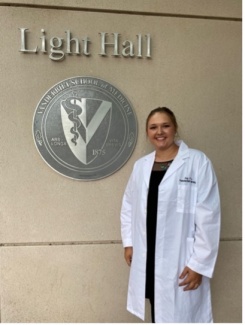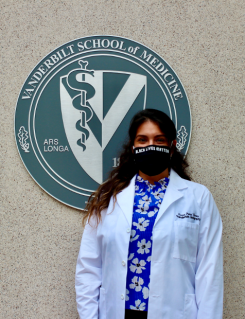We are a group of faculty and first year graduate students who are embarking on a travel expedition into the microbial world. Check this site for a description of what we learn and see along the journey. You can also follow us on Twitter! @ClassMicro
We welcome your constructive feedback!
A Tick's Meal
Kacie Traina
February 24, 2022
On episode 258 of the podcast “This Week in Microbiology”, Vincent Racaniello, Elio Schaechter, Michele Swanson, and Michael Schmidt discussed two main topics focused on anti-genetic variation within dengue virus serotypes and how a novel mRNA vaccine could induce antibodies against tick proteins to prevent transmission of Lyme disease.
Microbial Origins of Body Odor
Elizabeth Semler
February 23, 2022
Viruses can do that too?
Microbial_wanderlust
February 9, 2021
Bacteriophages, or phages, are a type of virus that specifically target bacteria for resources and reproduction1. The diversity of phages in size, functional capability, and genetic information is exponentially increasing as more are discovered and characterized. In general, phage infect a specific species of bacteria. Almost all phages have similar structures, consisting of a capsid “head” that stores genetic information and a “tail” that is used to interact with a host. Like other viruses, phages do not have a nucleus.
Skin microbiota: Roles in barrier maintenance & repair
Teresa Torres, @tsosciency
February 8, 2021
In recent years, the human microbiome began to be considered one of the major organs of the human body; it is defined as the collection of all the microorganisms living in symbiosis with the body (Human Microbiome Project, NIH).
Alcanivorax, an efficient cleaner of our oceans
Steven Wall
February 8, 2021
Our oceans are chock-full of microbes, from the clear blue waters to the darkest depths. In fact, the reason ocean water is so clear in some areas is due to the nearly perfect utilization of nutrients in the water. Even though many people might find the thought of bacteria disgusting, they are invaluable members of marine ecosystems. Along with other microbial life, they are responsible for the majority of the nutrient cycling that
The Superpowers of P. luminescens
Kateryna N.
February 7, 2021
The richness of the bacterial world is truly astonishing. While it is impossible to know an exact number of bacterial species on our planet, some reports help us appreciate the scope of the bacterial diversity.
A Microbe You May Not Know
Clostridium bonelium
February 7, 2021
On this episode of the podcast “This Week in Microbiology” Vincent Racaniello, Elio Schaechter, Michele Swanson, and Michael Schmidt discussed the research paper from the National Institute of Allergy and Infectious Disease (NIAID) by Myles et al. titled “Therapeutic responses to Roseomonas mucosa in atopic dermatitis may involve lipid-mediated TNF-related epithelial repair” which discussed the skin microbiome and atopic dermatitis.
The Story of Antibiotics and Bacterial Resistance
Abbie Weit
February 6, 2021
In the lecture taught by Dr. James Cassat, our class learned about the history of antibiotic discovery. The timeline started with penicillin which was discovered by Alexander Fleming. After a vacation to Scotland in 1928, Fleming returned to his lab to find a plate of staphylococcus that had been left out on the bench.
A Whiff of Taxonomy – The Apicomplexa by Moselio (Elio) Schaechter
CVRVC
February 6, 2021
Apicomplexa are a phylum of parasitic alveolates that get their name from the presence of the apical complex. The apical complex consists of many microtubules and secretory organelles, such as the micronemes and the rhoptries.









